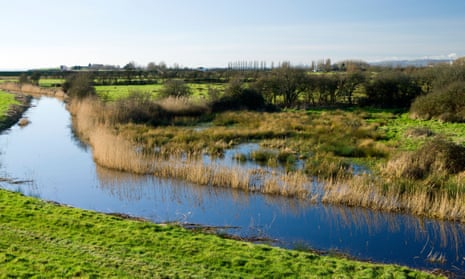A controversial scheme to build a £1.4bn motorway through the Gwent Levels in south Wales has been scrapped by the Labour-led Welsh government.
The move has been welcomed by environmentalists who said carving a 14-mile, six-lane stretch of motorway around the city of Newport would wreck a precious and historic landscape.
But it has angered many business leaders and some opposition politicians who believed the M4 relief road was needed to ease congestion on the main route into south Wales.
The project would have been the most expensive infrastructure project the Welsh government had embarked on. A year-long public inquiry examined the pros and cons and ruled in favour.
But the Welsh first minister, Mark Drakeford, announced on Tuesday he was shelving the project on the grounds of cost and its environmental impact.
He said: “I recognise the inspector’s conclusions. However, I attach greater weight than the inspector did to the adverse impacts that the project would have on the environment.
“In particular, I attach very significant weight to the fact that the project would have a substantial adverse impact on the Gwent Levels SSSIs [sites of special scientific interest] and their reen [drainage ditch] network and wildlife, and on other species, and a permanent adverse impact on the historic landscape of the Gwent Levels.”
Drakeford said austerity and Brexit contributed to the decision.
He said: “This decision is being made at the point of maximum uncertainty about our financial future. Unprecedented austerity in the public finances is combined with a complete lack of clarity over our capital budgets for the coming years, and is exacerbated by the uncertainty surrounding Brexit.” He said a commission would look at alternative solutions to the traffic problems around Newport.
The Gwent Wildlife Trust was among the fiercest opponents of the scheme, fearing it would devastate the levels, home to otters, water voles and wading birds.
The Romans first drained the area to create a breadbasket for their army before a push into the Welsh mountains. The network of drainage ditches are home to fauna and flora including the rare king diving beetle, as well as the nationally scarce rootless duckweed (wolffia arrhiza), the smallest vascular plant on Earth. The trust compares the richness of the biodiversity of the area to that of the Amazon rainforest.
Its chief executive, Ian Rappel, said: “We are delighted for both people and wildlife that the UK’s most ecologically damaging motorway scheme has been scrapped for good and we congratulate the first minister on his decision.
“At a time when international studies have revealed that the world is on the brink of the sixth mass extinction – where 40% of our insects are declining and after a climate emergency was declared in Wales – Welsh government should be congratulated for the bold decisions they are making for the future health of people and wildlife.”
It is the third time since devolution that Welsh ministers have shelved the project. Welsh Labour’s manifesto for the 2016 assembly elections, under the leadership of the former first minister Carwyn Jones, said the party would deliver “an M4 relief road”.
The Conservative party criticised the decision, with the shadow minister for business, economy and infrastructure in the assembly, Russell George, claiming the announcement was a “kick in the teeth” for Welsh commuters and business people.
“After years of procrastination and dithering from successive Welsh Labour governments, £44m spent on a public inquiry, and numerous pleas of help from business leaders, we’ve got nowhere,” he said.
“It’s shameful that the first minister has poured millions of pounds down the drain in completing the inquiry, yet only to ignore its findings. Congestion on this road is a foot on the windpipe of the south Wales economy, and is damaging our businesses and their future prospects. I’m now urging the first minister to end the uncertainty and quickly give us an alternative to how he intends to alleviate congestion on the M4.”
RSPB Cymru welcomed the move, saying: “The array of wildlife shows what a special place the Gwent Levels is and it is also a very special place for the communities that live there whose wellbeing is restored by this precious green space that exists so close to Cardiff and Newport.”
It picked out the shrill carder bee as one of the species that would be protected thanks to the decision. “The Gwent Levels population is one of its two remaining strongholds in the whole of the UK,” the charity said, adding that the crane had also recently returned to breed on the levels after an absence of more than 400 years.
The director of Friends of the Earth Cymru, Haf Elgar, said: “This is a great news for Wales and the planet. This decision is testament to the untiring efforts of local residents who have opposed this plan over decades.”
Darren Shirley, the chief executive of Campaign for Better Transport, said: “This signifies the end of business as usual for new road building. At a time when we urgently need to tackle air pollution and greenhouse gas emissions we can’t afford for this decision to be a brave one-off.”
But Stephen Crabb, the MP for Preseli Pembrokeshire, said the Welsh government had “bottled it”, adding: “We may as well put a sign at the Severn Bridge saying: ‘Wales closed to new business.’”
